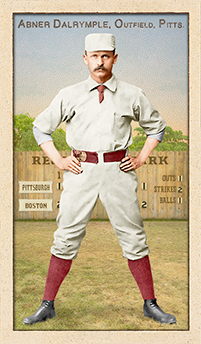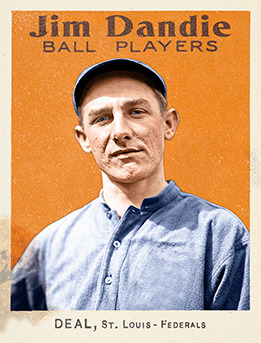
- Series: Jim Dandie Feds
- City: St. Louis
- Team: Terriers
- League: Federal League
Charles Albert Deal (1891-1979) like many of his peers in the early decades of baseball wanted to be fairly compensated for his talents, a concept alien to most of the owners of his day. Not even a spot on the Miracle Braves of 1914 could hold Deal's loyalty when the Federal League offered a chance at better pay. Charlie had played for Detroit in 1912-13 before joining Boston's club during the 1913 season. He was a decent third baseman who must have impressed his new team when he hit .306 late in '12. Unfortunately, although the 1914 Braves had a year for the ages, Charlie hit a mere .210 and saw greener pastures with the St. Louis Terriers in the Federal League's second and final season in '15. The move proved extremely lucrative for Deal. His salary ballooned from $2400 to $4500 plus a $3500 bonus. This may have been emblematic of the financial turmoil the Federals introduced and which led to the demise of such a profligate operation - in the minds of the establishment of the day. After the Terriers folded, Charlie played briefly for the Browns but found a home with the Cubs in 1916. In his tenure in the Windy City, interrupted by wartime obligations, Deal established himself as one of the best third basemen of the day. He never was able to hit much above his .250 norm but stayed with the Cubs through the 1921 season on the strength of his fielding prowess.
- Deal still had a taste for the game after ending his time in the big leagues. He went west and played for the Los Angeles Angels for two years and even played for the Vernon Tigers in 1924 in the industrial heart of South LA.
- Charlie moved up to Portland, still in the PCL, in '25 and wrapped up his professional career with the Southern Association's New Orleans Pelicans in 1926
- Series: Beginnings: 1880's
- City: Pittsburgh
- Team: Alleghenys
- League: National League
Abner Dalrymple (1857-1939) was one of the most prolific hitters of the fledgling NL. He was the leadoff batter for 8 straight years (with 5 pennants) for the Chicago White Stockings, contributing to a team home run record in 1884 that stood until eclipsed by the ’27 Bronx Bombers. He hit over .300 six times.
- Still shares a record for 4 doubles in 4 at-bats, July 3, 1883
- A.G. Spalding paid $2500 (!) to get Dalrymple from the Milwaukee Grays in 1878
- Dalrymple earned that confidence, winning the NL batting title in his rookie year
- In 1881 became first ever batter to be intentionally walked with bases loaded
- Dalrymple's uniform color in this card was changed from blue to red in August, 2017 to reflect recent reliable research conducted by Craig Brown and friends at Threads of Our Game. Two cards were previously released featuring a blue uniform
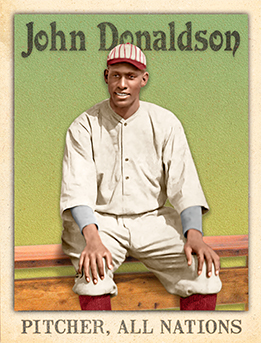
- Series: Diamond Heads '15
- Team: All Nations
- League: Independent
John Wesley Donaldson (1891-1970) “was the most amazing pitcher I ever saw” said J. L. Wilkinson, who had seen them all: Cubans, Blacks, Whites and the best female players of the early 20th century. Wilkinson's All Nations team was a famed forbear of the Negro Leagues of which he was a founder. He told Satchel Paige that, had Donaldson been available to play for their Kansas City Monarchs, Paige would have been behind John in the rotation. Research has documented as many as 399 wins in Donaldson's long career in black baseball; a career that would have been quite different had he heeded John McGraw's plea to adopt a Cuban persona, renounce his family ties and come play in the major leagues. McGraw later said he'd have paid $50,000 for the left-hander but for the color barrier. But Donaldson was a man of integrity and dignity. He wouldn't stoop to denying his heritage and thus remained in the “bushes” as modern baseball unfolded without him on the mounds that he deserved. Amateur historian Peter Gorton has made Donaldson his occupation, gathering records from libraries and news files around the country. Published box scores reveal games of phenomenal strikeout performances with the highest being 31 in an 18-inning game. John was just too good for the caliber of players he was able to face.
- Donaldson first pitched for clubs in Missouri before touring with the barnstorming Tennessee Rats and then the All Nations. His 30-year career ended in 1949, two years after Jackie Robinson debuted in Brooklyn
- 4,915 strikeouts have been documented for Donaldson. Remarkably, this total does not include the strikeouts from more than 150 games in which Donaldson pitched, but for which statistical data is lacking
- Research shows that Donaldson compiled a 1.37 ERA over his 30 year career, during which he also threw 13 no hitters and one perfect game.
- Donaldson had two, 30-k games; eleven, 25+ K games; thirty, 20+ K games
- Despite never playing in MLB, Donaldson did become the first full-time black scout in major league history. He scouted for the Chicago White Sox from 1949 into the 1950s
- Of Donaldson, John McGraw said, “I think he is the greatest I have ever seen.”
- J.L. Wilkinson credits Donaldson with suggesting the name “Monarchs” for Wilkinson’s pioneering Negro League team from Kansas City
- In 2006 the special HOF committee charged with evaluating pre-Negro League talent declined to include Donaldson
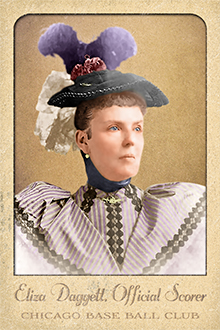
- Series: Pioneer Portraits II: 1875-1899
- City: Chicago
- Team: White Stockings
- League: National League
Eliza G. Green Williams Brown Daggett (1851-1926) was hailed in her hometown in 1920 as “the woman who has made Attleboro famous.” As the first female in the Bay State to seek mayoral office, Eliza was, indeed, noteworthy. But it was her surreptitious labors for Al Spalding under her maiden name that earned her a place in the annals of baseball as well as politics.
Al Spalding's White Stockings (Cubs) had many a fractious player - “kickers” in the jargon of the day. Spalding needed someone to bring a sane, objective and expert eye to the task of recording for posterity the hits, errors and miscellanea of the club's performance; someone impervious to the importuning of players lobbying for favorable rulings from the scorekeeper. He found what he needed in a lady who lived across from the ballpark, a woman who was an avid fan and an inveterate record-keeper. Eliza scored every home game and she had the cool, detached manner of a secret agent. Spalding recruited her to be his anonymous official scorer and, for a decade (1882-91), Eliza sat with the players' wives, keeping meticulous score and passing judgement on hits and errors - even settling player arguments - but never betraying her professional role. The National League officials to whom Eliza dispatched her score cards never knew that “E.G. Green” was a woman, allowing Spalding to avoid the scandal that would have ensued had it been known that a woman held such an important job in the sports world of Nineteenth Century America.
- Eliza was able to avoid detection completely, even from club-omniscient captain Adrian Anson, despite the fact that Eliza usually performed her duties while sitting beside Anson's wife.
- Apparently, Eliza kept the secret even from her family. Her son Charles recounts that he would mail the scorecards to Major League Baseball for his mother, without ever knowing the contents or purpose of the packages.
- Daggett was a devoted suffragist, a friend of Susan B. Anthony, and a tireless campaigner for the Republican Party long before seeking office for herself
- Her son Charles Williams was team treasurer for the Cubs during their championship season of 1908
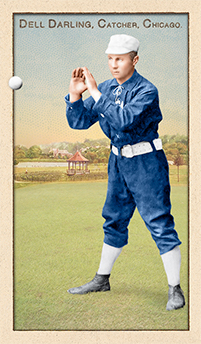
- Series: Beginnings: 1880's
- City: Chicago
- Team: White Stockings
- League: National League
Conrad Darling (1861-1904) was a modest-hitting journeyman catcher knocking around the hard-scrabble baseball towns of western Pennsylvania when The Sporting Life took note of his work following the 1886 season: “Darling was undoubtedly the most valuable man behind the bat in the International League.” Suddenly, Dell was in demand, spurning an offer from Jim Mutrie’s Giants and signing with Cap Anson’s Colts. He played well but sporadically until trying his fortune with Comiskey’s Chicago Pirates in the 1890 Players’ League. His career was in steep decline, likely due to the usual toll of catching in the big leagues. Dell played only part time for the Browns in ‘91 before hanging ‘em up. He did gain a short bit of notoriety by being implicated in a massive scheme to rob moving trains. He and other ballplayers were accused of pilfering baggage and tossing the spoils to confederates trackside. The publicity faded shortly with no indictment.
- The origin of Darling’s nickname is unknown but stayed with him through his obituary
- It was speculated that an old baseball injury contributed to Dell’s early demise
- Darling's uniform color in this card was changed from black to blue in March, 2017 to reflect recent reliable research conducted by Craig Brown and friends at Threads of Our Game. One card had been previously released featuring a black uniform.

